In the Western Desert Rommel had broken off his attack on El Alamein and his army, far from its supply bases and short of supplies, was now digging in; the British Eighth Army in contrast was refitting and preparing to go on the offensive. Meanwhile in Russia the Soviet high command believed that Moscow to the north was the Germans’ real objective, not Stalingrad, and pulled troops back for the defence of the capital and counter-attacked. Also this week, on 6 July in occupied Amsterdam Anne Frank and her family went into hiding; as Jews they would be sent to a concentration camp if the authorities caught them.
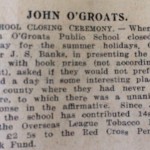
It was the start of the school holidays in Caithness, and the annual prizes were being handed out. In John O’Groats School, as the John O’Groat Journal reported, “Councillor J.S. Banks, in presenting the children with book prizes (not according to merit), asked if they would not prefer to spend a day in some interesting place in the county where they had never been before.” Unsurprisingly “there was a unanimous response in the affirmative”!
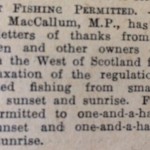
The paper also reported that another wartime restriction had been lifted, affecting crofter-fishermen and other owners of small boats in the West of Scotland: the “regulation which prohibited the fishing from small boats between sunset and sunrise. Fishing is now permitted to one-and-a-half hours after sunset and one-and-a-half hours before sunrise.”
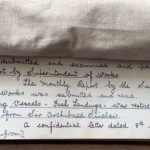 Indeed, it was clear that many people now had the sense that the tide of the war was on the
Indeed, it was clear that many people now had the sense that the tide of the war was on the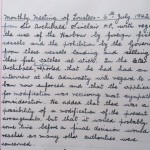 turn at last. Wick Harbour Trust this week debated the ban on foreign fishing vessels being allowed to land their catches and sell them in Wick, which was having a detrimental effect on harbour revenues. They’d approached Sir Archibald Sinclair M.P. for help, and he now wrote to say that “he had had an interview at the Admiralty with regard to the ban now enforced and that the application for modification was receiving most sympathetic consideration.”
turn at last. Wick Harbour Trust this week debated the ban on foreign fishing vessels being allowed to land their catches and sell them in Wick, which was having a detrimental effect on harbour revenues. They’d approached Sir Archibald Sinclair M.P. for help, and he now wrote to say that “he had had an interview at the Admiralty with regard to the ban now enforced and that the application for modification was receiving most sympathetic consideration.”
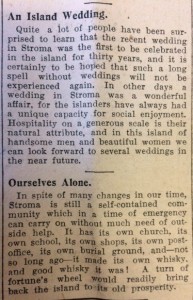 Finally this week, “Norseman” in the John O’Groat Journal reported that a recent wedding on the island of Stroma “was the first to be celebrated in the island for thirty years”. After expressing the hope that this would be the first of many, the writer reflected poignantly that Stroma was still a self-sufficient community: “It has its own church, its own school, its own shops, its own post-office, its own burial ground, and – not so long ago – it made its own whisky, and good whisky it was! A turn of fortune’s wheel would readily bring back the island to its old prosperity.”
Finally this week, “Norseman” in the John O’Groat Journal reported that a recent wedding on the island of Stroma “was the first to be celebrated in the island for thirty years”. After expressing the hope that this would be the first of many, the writer reflected poignantly that Stroma was still a self-sufficient community: “It has its own church, its own school, its own shops, its own post-office, its own burial ground, and – not so long ago – it made its own whisky, and good whisky it was! A turn of fortune’s wheel would readily bring back the island to its old prosperity.”
